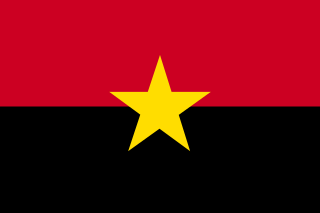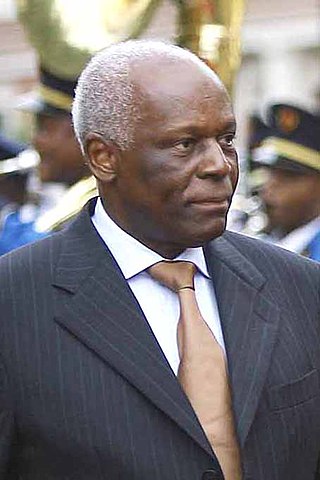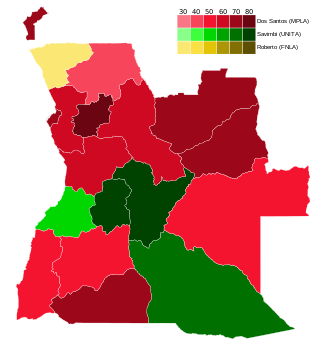
Angola was first settled by San hunter-gatherer societies before the northern domains came under the rule of Bantu states such as Kongo and Ndongo. In the 15th century,Portuguese colonists began trading,and a settlement was established at Luanda during the 16th century. Portugal annexed territories in the region which were ruled as a colony from 1655,and Angola was incorporated as an overseas province of Portugal in 1951. After the Angolan War of Independence,which ended in 1974 with an army mutiny and leftist coup in Lisbon,Angola achieved independence in 1975 through the Alvor Agreement. After independence,Angola entered a long period of civil war that lasted until 2002.

The National Union for the Total Independence of Angola is the second-largest political party in Angola. Founded in 1966,UNITA fought alongside the People's Movement for the Liberation of Angola (MPLA) and the National Liberation Front of Angola (FNLA) in the Angolan War for Independence (1961–1975) and then against the MPLA in the ensuing civil war (1975–2002). The war was one of the most prominent Cold War proxy wars,with UNITA receiving military aid initially from the People's Republic of China from 1966 until October 1975 and later from the United States and apartheid South Africa while the MPLA received support from the Soviet Union and its allies,especially Cuba.

Jonas Malheiro Savimbi was an Angolan revolutionary,politician,and rebel military leader who founded and led the National Union for the Total Independence of Angola (UNITA). UNITA was one of several groups which waged a guerrilla war against Portuguese colonial rule from 1966 to 1974. Once independence was achieved,it then became an anti-communist group which confronted the ruling People's Movement for the Liberation of Angola (MPLA) during the Angolan Civil War. Savimbi had extensive contact with anti-communist activists in the United States,including Jack Abramoff and was one of the leading anti-communist voices in the world. Savimbi was killed in a clash with government troops in 2002.

The People's Movement for the Liberation of Angola,from 1977–1990 called the People's Movement for the Liberation of Angola –Labour Party,is an Angolan social democratic political party. The MPLA fought against the Portuguese Army in the Angolan War of Independence from 1961 to 1974,and defeated the National Union for the Total Independence of Angola (UNITA) and the National Liberation Front of Angola (FNLA) in the Angolan Civil War. The party has ruled Angola since the country's independence from Portugal in 1975,being the de facto government throughout the civil war and continuing to rule afterwards.

JoséEduardo dos Santos was an Angolan politician and military officer who served as the president of Angola from 1979 to 2017. As president,dos Santos was also the commander-in-chief of the Angolan Armed Forces (FAA) and president of the People's Movement for the Liberation of Angola (MPLA),the party that has ruled Angola since it won independence in 1975. By the time he stepped down in 2017,he was the second-longest-serving president in Africa,surpassed only by Teodoro Obiang Nguema Mbasogo of Equatorial Guinea.

The National Front for the Liberation of Angola is a political party and former militant organisation that fought for Angolan independence from Portugal in the war of independence,under the leadership of Holden Roberto.

The Angolan War of Independence,known as the Armed Struggle of National Liberation in Angola,was a war of independence fought between the Angolan nationalist forces of the MPLA,UNITA and FNLA,and Portugal. It began as an uprising by Angolans against the Portuguese imposition of forced cultivation of only cotton as a commodity crop. As the resistance spread against colonial authorities,multiple factions developed that struggled for control of Portugal's overseas province of Angola. There were three nationalist movements and also a separatist movement.

The Angolan Civil War was a civil war in Angola,beginning in 1975 and continuing,with interludes,until 2002. The war began immediately after Angola became independent from Portugal in November 1975. It was a power struggle between two former anti-colonial guerrilla movements,the communist People's Movement for the Liberation of Angola (MPLA) and the anti-communist National Union for the Total Independence of Angola (UNITA).

Angola and the United States have maintained cordial diplomatic relations since 1993. Before then,antagonism between the countries hinged on Cold War geopolitics,which led the U.S. to support anti-government rebels during the protracted Angolan Civil War.

General elections were held in Angola on 29 and 30 September 1992 to elect a President and National Assembly,the first time free and multi-party elections had been held in the country. They followed the signing of the Bicesse Accord on 31 May 1991 in an attempt to end the 17-year-long civil war. Voter turnout was 91.3% for the parliamentary election and 91.2% for the presidential election.

Since its independence from Portugal in 1975,Angola has had three constitutions. The first came into force in 1975 as an "interim" measure;the second was approved in a 1992 referendum,and the third one was instituted in 2010.
The 1970s in Angola,a time of political and military turbulence,saw the end of Angola's War of Independence (1961–1975) and the outbreak of civil war (1975–2002). Agostinho Neto,the leader of the People's Movement for the Liberation of Angola (MPLA),declared the independence of the People's Republic of Angola on November 11,1975,in accordance with the Alvor Accords. UNITA and the FNLA also declared Angolan independence as the Social Democratic Republic of Angola based in Huambo and the Democratic Republic of Angola based in Ambriz. FLEC,armed and backed by the French government,declared the independence of the Republic of Cabinda from Paris. The National Liberation Front of Angola (FNLA) and the National Union for the Total Independence of Angola (UNITA) forged an alliance on November 23,proclaiming their own coalition government based in Huambo with Holden Roberto and Jonas Savimbi as co-presidents and JoséNdeléand Johnny Pinnock Eduardo as co-Prime Ministers.

Relations between Angola and South Africa in the post-apartheid era are quite strong as the ruling parties in both states,the African National Congress in South Africa and the MPLA in Angola,fought together during the Angolan Civil War and South African Border War. They fought against UNITA rebels,based in Angola,and the apartheid-era government in South Africa which supported them. Nelson Mandela mediated between the MPLA and UNITA during the final years of the Angolan Civil War. Although South Africa was preponderant in terms of relative capabilities during the late twentieth century,the recent growth of Angola has led to a more balanced relation.

The Cuban intervention in Angola began on 5 November 1975,when Cuba sent combat troops in support of the communist-aligned People's Movement for the Liberation of Angola (MPLA) against the pro-western coalition of the National Union for the Total Independence of Angola (UNITA) and theNational Liberation Front of Angola (FNLA). The intervention came after the outbreak of the Angolan Civil War,which occurred after the former Portuguese colony was granted independence after the Angolan War of Independence. The civil war quickly became a proxy war between the Eastern Bloc,led by the Soviet Union and the Western Bloc,led by the United States. South Africa and the United States backed UNITA and the FNLA,while communist nations backed the MPLA.

During Angola's civil war,Cuban forces fought alongside the Marxist–Leninist People's Movement for the Liberation of Angola (MPLA) government;against the Western-backed National Union for the Total Independence of Angola (UNITA) and National Liberation Front of Angola (FNLA) guerrillas who were aided by the South-African army. The present day outcome of the war resulted in the MPLA changing from a Marxist–Leninist party to a multi-party democratic system based on neoliberal principles. From an economic standpoint,Cuba has lost its preferred status among Angolans and South Africa has become the biggest single investor and trading partner with Angola.

Soviet–Angolan relations were close until the Angolan government renounced Marxist-Leninism in 1990 and adopted a pro-Western foreign policy. The close,personal relationship between President Agostinho Neto and Cuban leader Fidel Castro complicated the Soviet Union's involvement in the Angolan Civil War and foiled several assassination attempts against Neto.
In the 1990s in Angola,the last decade of the Angolan Civil War (1975–2002),the Angolan government transitioned from a nominally communist state to a nominally democratic one,a move made possible by political changes abroad and military victories at home. Namibia's declaration of independence,internationally recognized on April 1,eliminated the southwestern front of combat as South African forces withdrew to the east. The MPLA abolished the one-party system in June and rejected Marxist-Leninism at the MPLA's third Congress in December,formally changing the party's name from the MPLA-PT to the MPLA. The National Assembly passed law 12/91 in May 1991,coinciding with the withdrawal of the last Cuban troops,defining Angola as a "democratic state based on the rule of law" with a multi-party system.

The People's Republic of Angola was the self-declared socialist state which governed Angola from its independence in 1975 until 25 August 1992,during the Angolan Civil War.
This article deals with the activities of the U.S. Central Intelligence Agency (CIA) in Angola. The list of activities may be incomplete due to the clandestine nature of the subject matter.
The Halloween Massacre was a purge of UNITA party members and supporters carried out by Angola's ruling MPLA from October 30 to November 1,1992,in Luanda,Angola. The unrest occurred as a result of the breakdown of the Bicesse Accords,on account of alleged voter fraud in the 1992 Angolan general elections,resulting in renewed military tensions,assassinations of public figures,and acts of terrorism. Thousands of UNITA supporters are estimated to have been murdered.
















